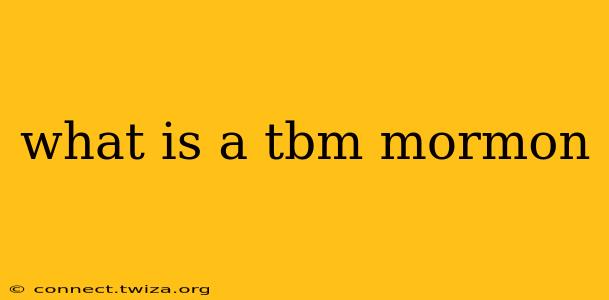The term "TBM Mormon" is internet slang within the Latter-day Saint (LDS) community, referring to a "True Believing Mormon." It's a descriptor, often used online in forums and social media groups, to denote a member who adheres strictly to the teachings and practices of The Church of Jesus Christ of Latter-day Saints. This adherence extends beyond simply attending church; it encompasses a commitment to church doctrine, leadership, and lifestyle choices considered consistent with traditional LDS values.
While not an official church designation, the term "TBM" offers a shorthand way to discuss individuals who strongly identify with traditional Mormonism. It's important to note that the meaning and connotations surrounding this term can vary depending on context and individual perspectives. Some use it neutrally, while others employ it with either positive or negative undertones.
What Beliefs and Practices Define a TBM Mormon?
TBMs generally hold to the following core beliefs and practices:
- Acceptance of Church Authority: TBMs typically have unwavering faith in the authority of church leaders and the scriptures (the Bible, Book of Mormon, Doctrine and Covenants, and Pearl of Great Price). They accept the teachings of General Authorities as divinely inspired and authoritative.
- Strict Adherence to Church Standards: This includes upholding the Word of Wisdom (a health code prohibiting alcohol, tobacco, and caffeine), observing the Sabbath day, paying tithing (10% of income), and following other principles outlined in church teachings.
- Traditional Family Values: TBMs generally prioritize the traditional family unit, emphasizing marriage between a man and a woman, and the importance of raising children within the framework of LDS teachings.
- Active Church Participation: Regular attendance at church services, participation in callings (volunteer positions), and involvement in church activities are commonplace for TBMs.
- Limited Engagement with Outside Perspectives: While not universally true, some TBMs might demonstrate a reluctance to engage with criticisms or alternative interpretations of LDS doctrine.
Are there Different Types of TBMs?
It's crucial to understand that even within the "TBM" category, there's a spectrum of belief and practice. Some TBMs might be more conservative than others, holding to stricter interpretations of church teachings. Others might hold more progressive views within the confines of the church's overall structure. The term doesn't neatly categorize individuals into a homogenous group.
What are the Different Perspectives on the Term "TBM"?
The term "TBM" can be viewed in several ways:
- Neutral: Some use it as a simple descriptor, akin to saying "active member."
- Positive: Others might use it positively to express admiration for someone's unwavering faith and dedication.
- Negative: In some contexts, especially within online discussions concerning disagreements or dissent within the LDS church, "TBM" can be used critically or even derisively. This often occurs when discussing differences in viewpoints on doctrine or church practices.
Why is this term used primarily online?
The term "TBM" is prevalent in online discussions because the anonymity and open-forum nature of the internet allow for more frank and sometimes less guarded conversations. Within the more formal structures of face-to-face interactions within the church, such labels are less commonly employed.
In conclusion, "TBM Mormon" is a nuanced term used within the online LDS community to identify those who adhere strongly to traditional LDS beliefs and practices. Understanding its context and connotations is key to interpreting its meaning accurately in any given situation. It's not a universally accepted term within the church, and its usage often depends on the speaker's perspective and the nature of the conversation.
